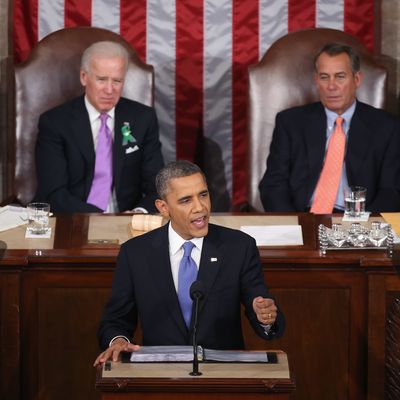
The first four State of the Union addresses delivered by President Obama all had a clear purpose. In 2009 and 2010, Democrats controlled both houses of Congress, and Obama’s speeches in those years served as tentpoles around which the party could organize its agenda. In 2011 and 2012, Republicans had gained control of the House of Representatives, making any serious legislative action impossible, but Obama could use the speeches to define himself and thus to lay the groundwork for his reelection campaign.
But now Obama has been reelected. Meanwhile, Republicans still control the House. So what is the point of a State of the Union address now, other than the fact that Obama is required to give it?
The vast majority of the speech was given over to Obama laying out his vision of the ideal. He laid out scads of new policy ideas, mostly appealing ones – a higher minimum wage, repairing infrastructure, commissions to reform voting, and so on. Obama wrapped all these ideas in the mantle of either proven social-science research supporting its merits, demonstrated bipartisan support, or both.
It doesn’t matter. The Republicans who support these things don’t hold seats in the House of Representatives and don’t have to worry about a right-wing primary challenge. I am setting the over/under on the number of these blue-sky proposals that will be passed into law during Obama’s second term at 0.5. It is interesting to hear Obama describe what American public policy would look like if he had untrammeled control of government, but it’s not helpful in predicting the next four years.
What we can do is pick out the few areas where circumstances might allow some action, and thus where Obama’s words might have some immediate practical relevance. The first is the upcoming budget cuts, or sequestration. Since the cuts would take a huge chunk out of defense, and wreak havoc with all sorts of businesses that interact with the federal government, Republicans might be persuaded to replace it with some sort of compromise combination of scaling back tax deductions and trimming spending on retirement programs. Obama used his platform to preemptively lay the blame for inaction on the Republicans (who are insisting they won’t accept any higher revenue in any form) while declaring his own willingness to compromise.
Second, he touted the need for immigration reform. This has a very strong chance to succeed, since Republicans have decided they urgently need to repair their standing among the expanding cohort of Latino voters. For that reason, Obama’s urging is largely irrelevant to the prospects for legislation — or even harmful. (60 percent of Republicans supported a path to citizenship in a recent poll, but the total dropped to 39 percent when Obama’s support was mentioned.)
The most newsworthy item of the speech was that Obama, after packaging his ideas as energy self-sufficiency and a way to create green jobs, forthrightly warned of climate change. He set the stage for unilateral regulatory action to cut down on carbon emissions:
If Congress won’t act soon to protect future generations, I will. I will direct my Cabinet to come up with executive actions we can take, now and in the future, to reduce pollution, prepare our communities for the consequences of climate change, and speed the transition to more sustainable sources of energy.
Obama has the power to impose powerful unilateral regulations on greenhouse-gas emissions. Whether Obama can follow through on this threat will probably amount to the defining struggle of his second term. A small passage in his speech will eventually be remembered as the opening salvo in a bloody fight of massive consequence.






























